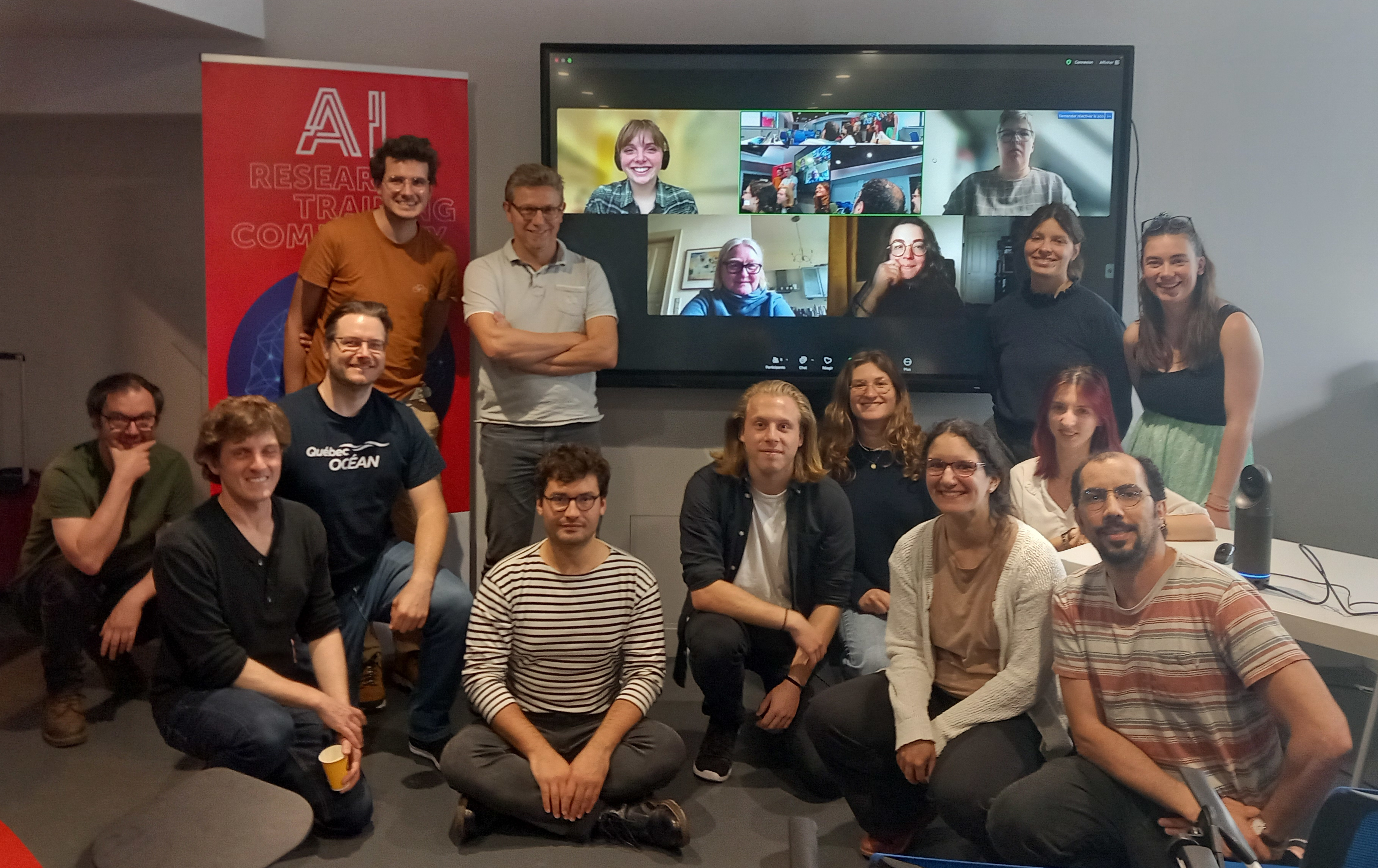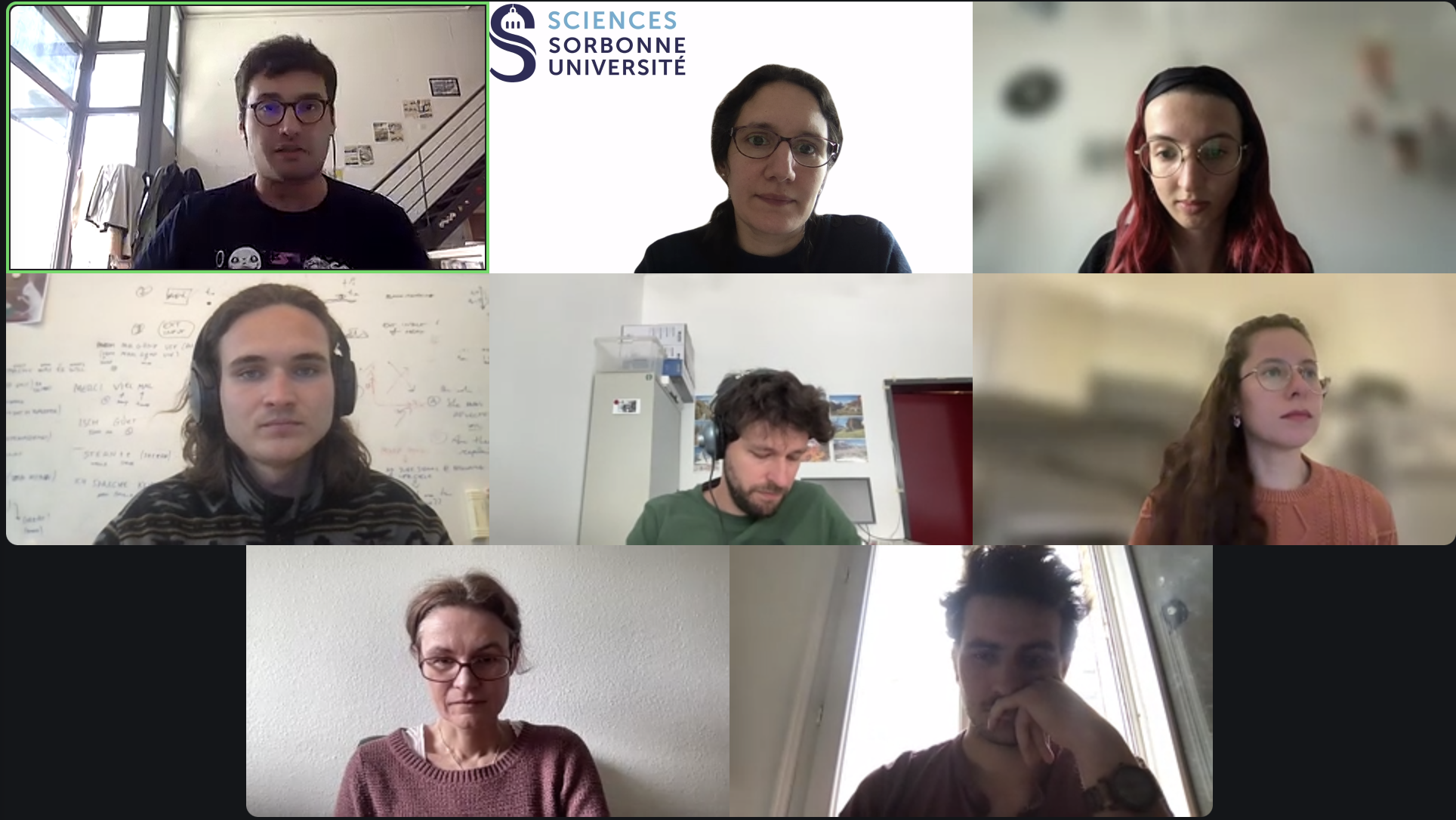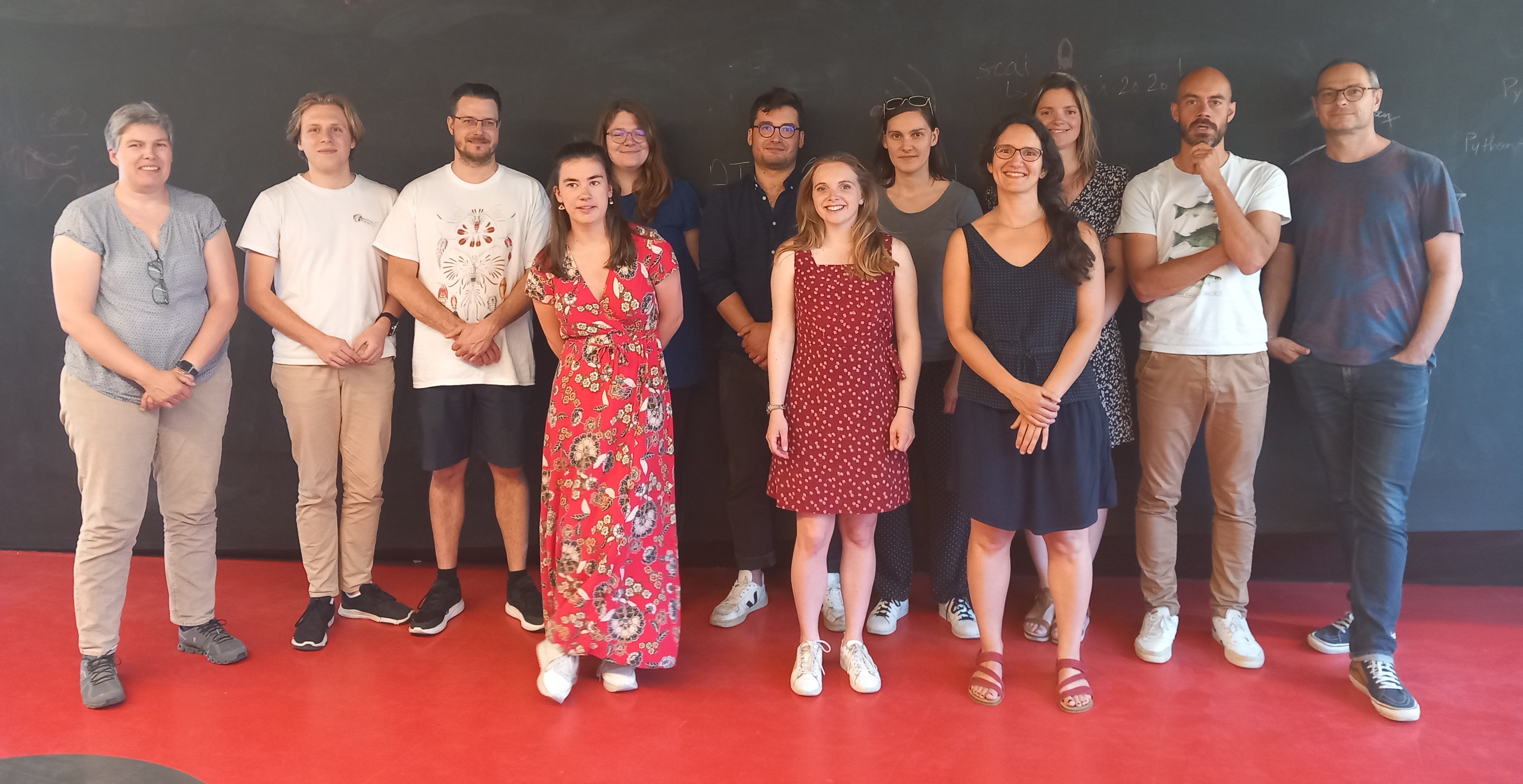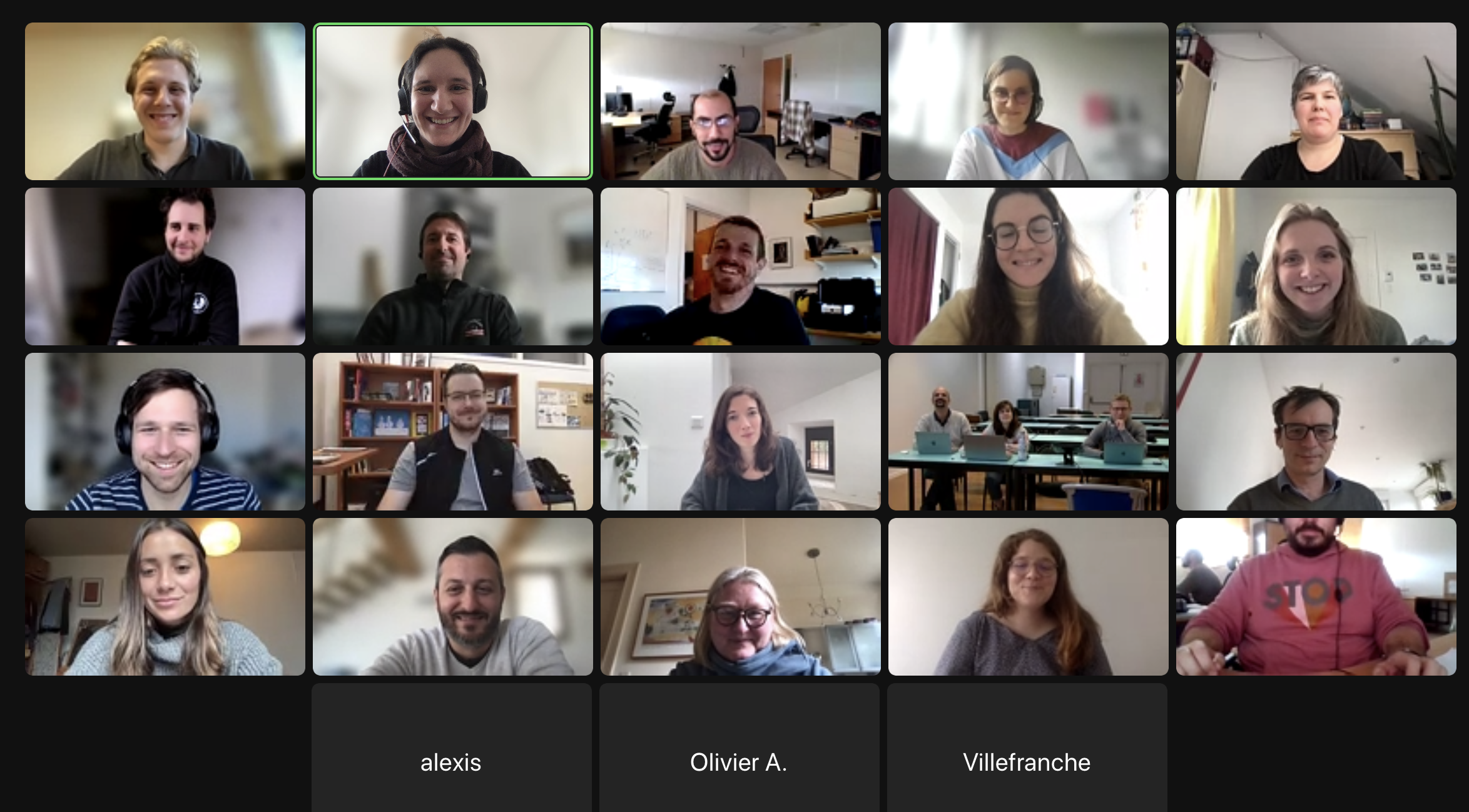Project description
TRAITZOO - Trait biogeography and functional diversity of marine mesozooplankton from high throughput data (imaging, omics), machine learning and numerical modelling, is a collaborative research project funded by the french research funding agency (the ANR) for 4 years (Janv 2023 - Dec 2026) with a total budget of 667 902 euros.
Project summary
Marine mesozooplankton play a crucial role in the functioning of pelagic ecosystems and global biogeochemical cycles. It is very diverse from a taxonomic and phylogenetic point of view (e.g., giant protists, copepod, krill, small jellyfish, fish larvae), but also functionally (e.g., small vs. large organisms, herbivores who are filtering-courant feeders vs. carnivores who are ambush feeders, vertical migrations, lipid reserve production, etc.). Yet, the link between mesozooplankton diversity and ecosystem functioning remains poorly understood.
TRAITZOO aims to decipher this link using a trait-based approach and taking advantage of recent developments in high-throughput sequencing and imaging of marine plankton. Using already available data, that has been collected in various biogeographical provinces of the global ocean and covering wide environmental gradients, mostly collected by our consortium, we will use numerical ecology and machine learning tools to 1) provide new tools to study functional traits from imaging and transcriptomic data, 2) describe the biogeography of functional traits and identify the main drivers of mesozooplankton functional diversity, and 3) improve marine ecosystem models and develop new trait-based models to better quantify plankton-mediated carbon fluxes. Our consortium brings together experts in mesozooplankton ecology and physiology, marine biogeochemistry, and applied mathematics. Our skills cover plankton imaging, transcriptomics, metabarcoding, biogeochemical modelling, individual-based modelling, statistics, and machine learning.
Project Members
TRAITZOO gathers researchers from 8 laboratories:
- LOCEAN Laboratoire d'Océanographie et du Climat : Expérimentations et Approches Numériques, Paris: Sakina-Dorothée Ayata (project PI, WP co-leader), Olivier Aumont (WP co-leader), Sara Labrousse, Cédric Cotté, Renaud Person, Camille Richon (post-doc), Margaux Perhirin (PhD candidate), Lisa Di Matteo (PhD candidate), Céleste Equilbey (M2 student 2023);
- LOV Laboratoire d'Océanographie de Villefranche, Villefranche-sur-Mer: Jean-Olivier Irisson, Lionel Guidi (WP co-leader), Fabien Lombard, Miriam Beck (post-doc):
- SEPIA CEA, Fontenay aux Roses: Amin Madoui (WP co-leader), Kevin Sugier (post-doc), Alexis Culpin (M1 student 2023);
- TAKUVIK Université Laval, Québec, Canada: Frédéric Maps (WP co-leader), Cyril Aubry, Lucie Bourreau (PhD candidate), Laure Vilgrain (PhD candidate 2019-2023);
- LOG Laboratoire d'Océanologie et de Géosciences, Wimereux: Tristan Biard (WP co-leader), Ruben Tournier-Boer (PhD candidate and M2 student 2023);
- LaMME laboratoire de Mathématiques et Modélisation d'Évry, Evry-sur-Seine:Christophe Ambroise;
- BIOS Bermuda Institute of Ocean Sciences, Arizona State University, Bermudes: Leocadio Blanco-Bercial, Amy Maas;
- AWI Alfred Wegener Institute, Germany: Barbara Niehoff, Astrid Cornils, Simon-Martin Schröder.
Please do not hesite to contact us if you what to join the team!
Filled positions within the project
- PhD thesis in biogeochemical modelling at the LOCEAN: Trait-based modeling of marine mesozooplankton feeding strategies at the global-scale. Lisa Di Matteo (detailed project here).
- PhD thesis in zooplankton biogeography at the LOG: Global trait biogeography and functional diversity of marine mesozooplankton from high throughput in situ imaging data. Rubén Tournier-Boer (detailed project here)
- Master 2 internship in biogeochemical modeling at the LOCEAN: Trait-based modeling of mesozooplankton feeding behaviors at the global-scale. Céleste Equilbey.
- Master 2 internship in numerical ecology at the LOG: Trait-based approaches applied to in situ plankton imaging to disentangle the ecology of mesozooplankton communities off California. Rubén Tournier-Boer.
- Post-doc in genomics at SEPIA: Identifying the molecular markers of functional traits from transcriptomics. Kevin Sugier.
- Master 1 internship in numerical ecology at the LOCEAN: Spatio-temporal distribution of copepod carcasses and moults identified from in situ images in Baffin Bay. Lalie Conrardy.
- Post-doc on Machine learning and individual imagery for numerical modelling of planktonic ecosystems at Takuvik: Machine learning and individual imagery for numerical modelling of planktonic ecosystems. Patrick Pata (staring in fall 2024).
- Post-doc on Studying zooplankton traits from imaging data at LOV: Studying zooplankton traits from imaging data. Sarah Hasnain (staring in fall 2024).
Open science in Traitzoo
TRAITZOO and the ANR promote Open Science. All scientific production should acknowledge the ANR funding and comply with the ANR's Strategy for Open Sciences, which means that you have to apply the Rights Retention Strategy (RRS) for publishing your research. This especially means that you should inform the editor that you apply the CC-BY Creative Commin licence on all the successive versions of your manuscript, from the submission to the version that will be accepted (also called post-print or AAM for Author Accepted Manuscript). Here is the sentence you should use in your cover letters to do so: "This research was funded, in whole or in part, by the French Agence Nationale de la Recherche (ANR), under grant ANR-22-CE02-0023-1 (project TRAITZOO). A CC-BY public copyright license has been applied by the authors to the present document and will be applied to all subsequent versions up to the Author Accepted Manuscript arising from this submission, in accordance with the grant’s open access conditions." And here is the CC-BY logo you should add on your documments. Once your article has been accepted, and as requested by ANR as a member of the cOAlition S, you should then immediately made the post-print/AAM version available on a public archive, like HAL, indicating the CC-BY 4.0 licence.
To know more about Open Science, you can have a look at this 1h-webinar on the Strategies for publishing in Open Access Journals and/or follow this MOOC from Sorbonne University on open access publication and data. The course is free, available both in French and in English, and represents about 8h of work.
You can also find more on the Rights Retention Strategy (RRS - Stratégie de non-cession des droits sur les publications scientifiques) in this document in french.
Please use this sentence in your acknowledments: "The author(s) acknowledge(s) the support of the French Agence Nationale de la Recherche (ANR), under grant ANR-22-CE02-0023-1 (project TRAITZOO). For the purpose of open access, the authors have applied a CC-BY public copyright licence to any Author Accepted manuscript (AAM) version arising from this submission."
The logo of the ANR (full or small) should also be used for visual communication.
Communications related to the project
Conference for the general public and videos
- Feb 2024: Mini-conference 20 000 espèces sous les mers for the "Echappées Inattendues" of the CNRS at the "Art & Metier" Museum in Paris.
- March 2023: Video recorded mini-conference on marine plankton (in french) by SD Ayata. General public conference "Le plancton marin, un rôle essentiel pour les écosystèmes marins et la planète", organised by the CNRS and the city of Meudon. "Les Echappées inattendues du CNRS : Les océans du futur". 28 mars 2023. Meudon. About 100 people. https://www.iledefrance-meudon.cnrs.fr/fr/evenement/les-echappees-inattendues-meudon-plongee-dans-locean-du-futur
- February 2023: Québec-Océan Video (in french) by F Maps about his reasearch on Arctic zooplankton.
Press releases and newsletters
- Sept 2024: congratulations to Ruben for his Fullbright grant to visit Mark Ohman's lab at UCSD in the United States of America!
- May 2023 - SU website on Copepod's redness by Laure Vilgrain. Un petit rouge qui vous veut du bien : les avantages de la couleur rouge chez le zooplancton
TRAITZOO journal clubs (JC)
- JC #8, 5th February 2025: Rohr et al. 2023
- JC #7, 8th January 2025: Brun et al. 2019
- JC #6, 4th December 2024: Heneghan et al. 2023
- JC #5, 6th November 2024: Anderson et al. 2024
- JC #4, 2nd October 2024: Ryderheim et al. 2023 (L&O)Short handling times allow for active prey selection in suspension feeding copepods
- JC #3, 3rd July 2024: Mayor et al. (2020, BioEssays)Ocean carbon sequestration: Particle fragmentation by copepods as a significant unrecognised factor?
- JC #2, 17 April 2024: Pata and Hunt (2024, L&O)Harmonizing marine zooplankton trait data toward a mechanistic understanding of ecosystem functioning.
- JC #1: 21 March, 2024: Barth et al. (2023, L&O) Size and transparency influence diel vertical migration patterns in copepods.
Project meeting
- Scientific days: 3-4 June 2024, Paris.

- AtlantEco-NECCTON-Traitzoo meeting: 17 May 2024 (online). Organized by Fabio Benedetti.

- WP leaders' meeting: 8 February 2024 (online).
- Scientific days: 14-15 June 2023, Paris.

- Kick-off meeting: 08 March 2023 (online).

Following the recommendation of Labos1point5, TRAITZOO is committed to reducing the carbon footprint of scientific research. If you want to know more about reducing the environmental footprint of our research activities, you watch this webinar by Olivier Aumont (in english).
Acknowledgments
Please use the following statement for acknowlegments: "The author(s) acknowledge(s) the support of the French Agence Nationale de la Recherche (ANR), under grant ANR-22-CE02-0023-1 (project TRAITZOO). For the purpose of open access, the authors have applied a CC-BY public copyright licence to any Author Accepted manuscript (AAM) version arising from this submission."


Credit for the picture in the banner: By Uwe Kils - CC BY-SA 3.0, https://commons.wikimedia.org/w/index.php?curid=8909272
The author of this web page would like to thank the EcoNet ANR project as this webpage was partly inpired from it.
A CC-BY public copyright licence has been applied to this webpage.